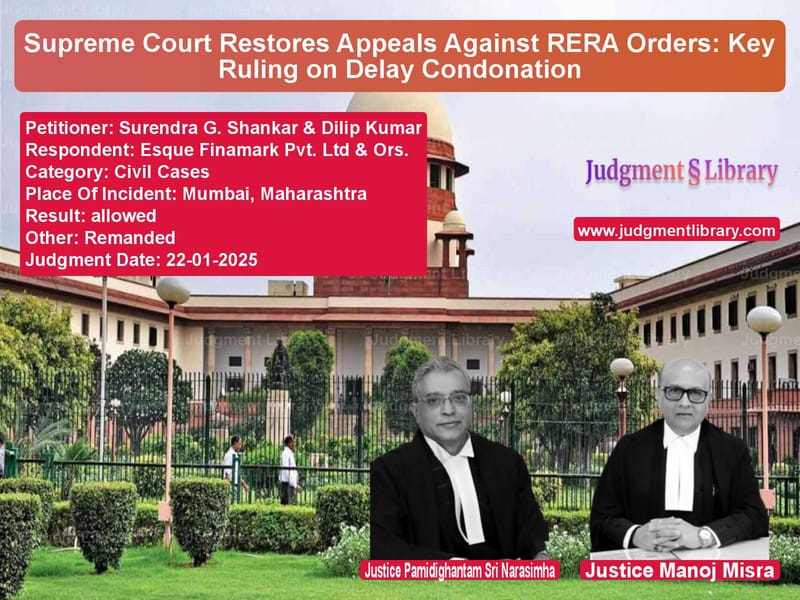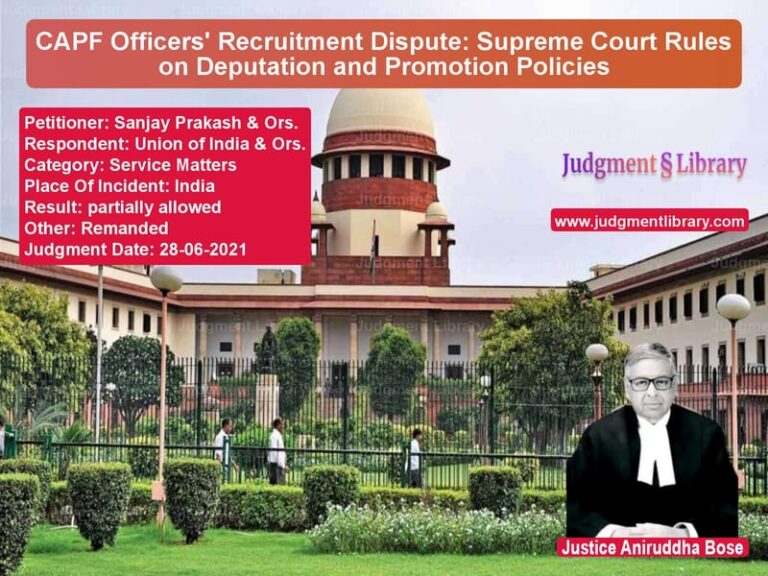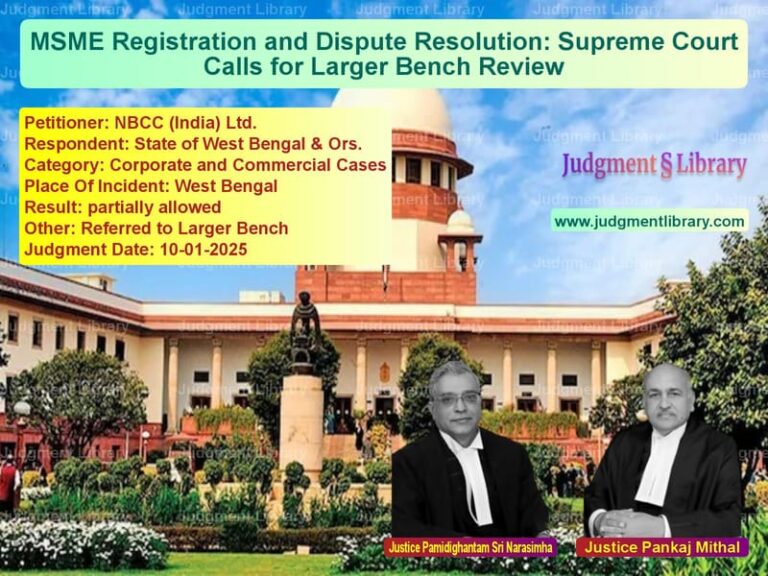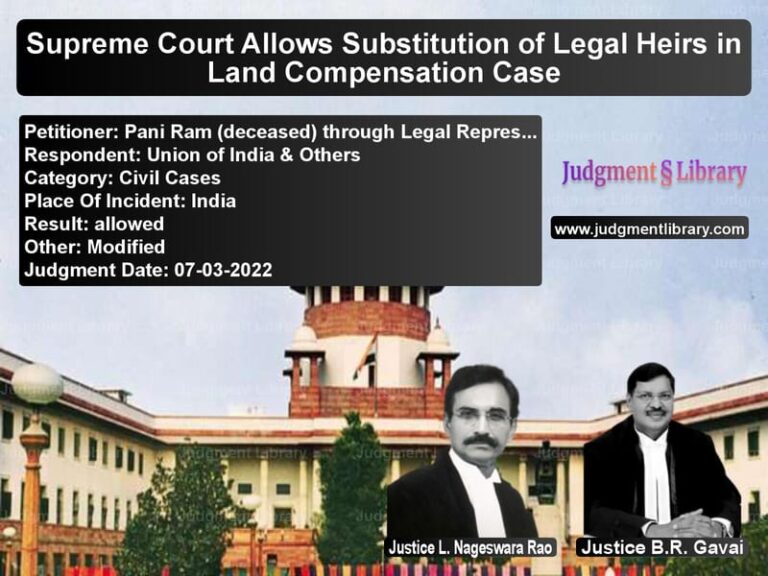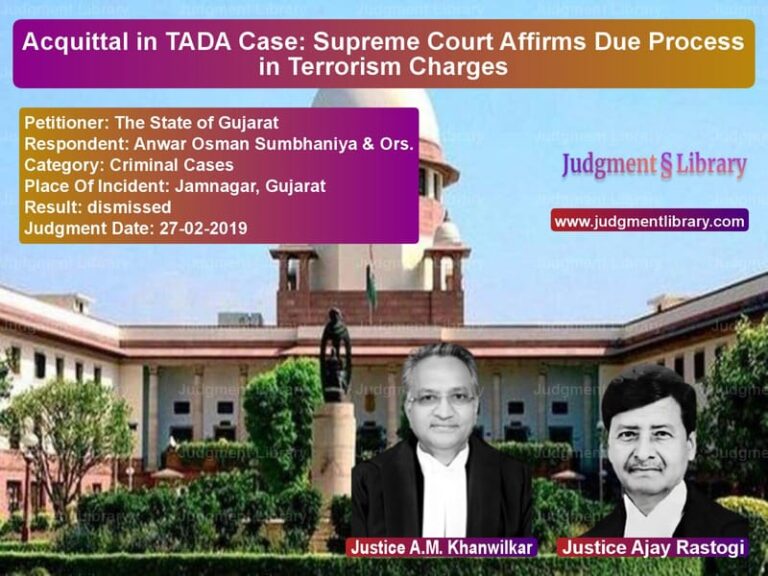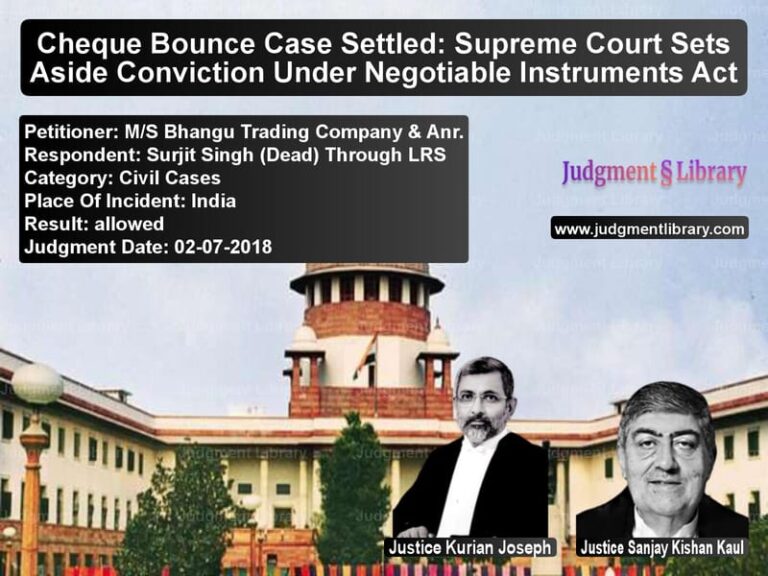Supreme Court Restores Appeals Against RERA Orders: Key Ruling on Delay Condonation
The Supreme Court of India, in the case of Surendra G. Shankar & Anr. vs. Esque Finamark Pvt. Ltd. & Ors., delivered a significant judgment addressing the issue of delay condonation in appeals against RERA orders. The case involved two separate appeals challenging the Bombay High Court’s order, which refused to condone the delay in filing appeals before the Maharashtra Real Estate Appellate Tribunal, Mumbai.
Background of the Case
The appellants, Surendra G. Shankar and Dilip Kumar, had booked flats in real estate projects, “Lodha Venezia” and “Lodha Azzuro,” developed by Macrotech Developers Ltd. (formerly Lodha Developers Ltd.). They filed complaints before Maharashtra Real Estate Regulatory Authority (RERA), Mumbai, against Esque Finamark Pvt. Ltd. (R-1) and Macrotech Developers Ltd. (R-2), alleging delays in possession.
During the proceedings, RERA discharged Macrotech Developers Ltd. (R-2) from the case on July 23, 2019, accepting their argument that there was no privity of contract between the complainants and R-2. Subsequently, on October 16, 2019, RERA dismissed the complaints entirely.
Appeal Before the Maharashtra Real Estate Appellate Tribunal
The appellants filed appeals against the RERA orders before the Maharashtra Real Estate Appellate Tribunal on December 10, 2019, within the statutory period of 60 days for challenging the final order of October 16, 2019. However, since their appeals also challenged the earlier order of July 23, 2019 (discharging R-2), they filed a separate application for condonation of delay.
The Appellate Tribunal, Mumbai, on December 1, 2022, dismissed their appeals as time-barred, holding that:
- The order dated July 23, 2019, was passed in the presence of the parties.
- The appellants should have immediately challenged the discharge of R-2 rather than waiting for the final dismissal of their complaints.
- There was no sufficient cause to condone the delay.
Appeal Before the Bombay High Court
Aggrieved by the Appellate Tribunal’s decision, the appellants filed Second Appeals (Nos. 475 & 188 of 2023) before the Bombay High Court. The High Court, on August 23, 2023, upheld the Appellate Tribunal’s order, observing:
“In the normal circumstances, I would have condoned the delay. However, it appears that the order dated 23 July 2019 was passed with consent. According to the learned counsel for the appellant(s), the Advocate was not authorized to give such consent. However, admittedly, no application was thereafter made seeking recall of the said order.”
The High Court refused to interfere with the Tribunal’s decision, leading the appellants to approach the Supreme Court.
Supreme Court’s Observations
The Supreme Court Bench, comprising Justices Pamidighantam Sri Narasimha and Manoj Misra, delivered the judgment on January 22, 2025. The Court found that the High Court erred in refusing to condone the delay, given that the appeals were filed within the permissible period for challenging the final RERA order.
Key Findings
- The High Court acknowledged that the delay should have been condoned in normal circumstances but refused to do so based on procedural technicalities.
- The Appellate Tribunal had not examined the merits of the case; its decision was solely based on limitation.
- The High Court should have focused on whether the Appellate Tribunal rightly rejected the condonation application instead of making comments on the merits of the RERA orders.
Supreme Court’s Key Ruling
The Supreme Court held:
“Once the High Court opined that in normal circumstances the delay ought to have been condoned, it ought not to have commented upon the merits of the orders dated 23.07.2019 and 16.10.2019, particularly when the Appellate Tribunal, Mumbai had not dealt with the correctness of those orders.”
The Court further ruled:
“In such circumstances, the High Court should have set aside the order rejecting the delay condonation application, condoned the delay, and restored the appeals on the file of the Appellate Tribunal, Mumbai for consideration on merits.”
Final Judgment
The Supreme Court set aside the orders of the High Court and the Appellate Tribunal, ruling that:
- The delay in filing the appeals before the Appellate Tribunal was condoned.
- The appeals were restored on the file of the Appellate Tribunal for fresh adjudication on merits.
- The Appellate Tribunal should decide the appeals without being influenced by the High Court’s comments on the merits.
- The Court explicitly stated that it had not expressed any opinion on the merits of the RERA orders dated July 23, 2019, and October 16, 2019.
Impact of the Judgment
This ruling reinforces the principle that procedural technicalities should not stand in the way of substantive justice. The Supreme Court has emphasized that:
- Delay condonation should be considered liberally when an appeal is otherwise filed within the statutory period.
- High Courts should avoid making observations on the merits of a case when dealing with limitation issues.
- Real estate litigants should not be denied the right to appeal due to procedural lapses beyond their control.
Conclusion
The case of Surendra G. Shankar & Anr. vs. Esque Finamark Pvt. Ltd. & Ors. serves as an important precedent in real estate litigation and procedural law. The Supreme Court’s intervention ensures that homebuyers and real estate investors are not unfairly deprived of their legal remedies due to procedural constraints. By restoring the appeals and directing a fresh hearing on the merits, the judgment upholds access to justice in RERA-related disputes.
Petitioner Name: Surendra G. Shankar & Dilip Kumar.Respondent Name: Esque Finamark Pvt. Ltd & Ors..Judgment By: Justice Pamidighantam Sri Narasimha, Justice Manoj Misra.Place Of Incident: Mumbai, Maharashtra.Judgment Date: 22-01-2025.
Don’t miss out on the full details! Download the complete judgment in PDF format below and gain valuable insights instantly!
Download Judgment: surendra-g.-shankar-vs-esque-finamark-pvt.-supreme-court-of-india-judgment-dated-22-01-2025.pdf
Directly Download Judgment: Directly download this Judgment
See all petitions in Property Disputes
See all petitions in Specific Performance
See all petitions in Damages and Compensation
See all petitions in Contract Disputes
See all petitions in Consumer Rights
See all petitions in Judgment by P.S. Narasimha
See all petitions in Judgment by Manoj Misra
See all petitions in allowed
See all petitions in Remanded
See all petitions in supreme court of India judgments January 2025
See all petitions in 2025 judgments
See all posts in Civil Cases Category
See all allowed petitions in Civil Cases Category
See all Dismissed petitions in Civil Cases Category
See all partially allowed petitions in Civil Cases Category

